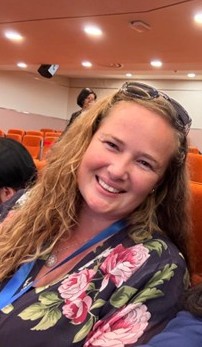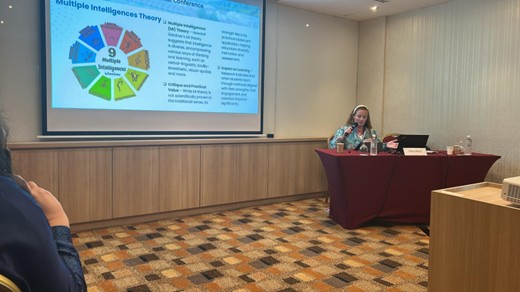CfBT Spotlight:
Talana Wilson
on creating an inclusive, student-centred classroom
Talana has been working in Brunei for about three and a half years. She was drawn to the idea of working with teachers from all over the world, as she loves learning from people’s experiences and approaches.
She added, “I knew CfBT would give me the chance to grow by being a part of a diverse team.”
Ever since she joined CfBT, she has gained an understanding of what good teaching looks like. She has realised how important it is for teachers to be adequately trained and genuinely motivated to create student-centred classrooms, where students want to learn and feel inspired to do their best.
This growing awareness has also deepened her understanding of the complexities involved in meeting the diverse needs of the students. One of the biggest challenges she has faced is managing a wide range of abilities in a single classroom. Providing support and remediation that caters to the more able and special needs students simultaneously is not easy. Recognising the range of students in her class, she became passionate about creating an inclusive classroom where lessons are personalised to the needs of her students.
Moreover, her passion stems from the desire to help her students reach their full potential by making learning engaging, relevant, and something that they actually look forward to. She discovered that one way to achieve this is by finding innovative ways to teach, especially for students who don’t necessarily thrive in standard one-size-fits-all classrooms that stray from traditional curricula.
Recognising the impact that thoughtful curriculum design could have on student success, she sought to deepen her expertise in the field. As a result, she decided to pursue her master’s degree focusing on curriculum design. She integrates Universal Design for Learning (UDL) and Multiple Intelligences (MI) theory, developed by Howard Gardner. Both models recognise that students have varied cognitive strengths and that they can learn and express understanding in different ways. They aim to remove barriers to learning and make education more equitable.
“I’ve come to really appreciate the value of offering students some choice where possible, something that ties in well with both UDL and MI”, she expressed.


Talana Wilson presented The Impact of Multiple Intelligences-Based Assessments on English Proficiency of Multilingual Bruneian Year 4 ESL Students at the RELC Conference.
When she began using MI and UDL principles in a lesson, there was a marked improvement in student enjoyment and engagement, which is reflected in their academic achievement. She observed that giving autonomy to more able students results in higher intrinsic motivation – they are more likely to put in more effort to complete difficult tasks. She also noticed that students who need more support and can’t work independently, due to difficulties with reading or writing, require more support and scaffolding.
“Moments that remind me why using MI and UDL principles are beneficial are the times my students get excited to start an activity, need very little external motivation to complete them, or when I hear the disappointed “Aah no!” when it’s nearly time to end the lesson. When students are sad to leave a lesson, you know they’ve enjoyed their time there, and what they have learnt there was valuable to them,” Talana added.
In her class, she also regularly celebrates small wins – acknowledging students’ progress, no matter how small – as it builds their confidence and in turn, creates a positive energy in the classroom. Talana emphasized,
“It reminds you why you do what you do and inspires other students to keep striving to do their best”
Besides contributing to changes in her class, she has been proactive in supporting her school’s initiatives. She’s particularly proud of her involvement in the STEAM program at school where she has written schemes of work, led upper primary themes, and facilitated teams entering national projects. She also implemented a reading program at her school in 2024, designed to support students from Year 1 all the way through to Year 6 focusing on building their reading skills step-by-step.
“Over the course of the year, we saw significant improvements in Lexile scores across all grades, which showed that the program was really making a difference.” Talana shared.
Ultimately, she recognises that teaching is a challenging career and one that is continuously evolving. She has also learned to focus on what she can control when things don’t go as expected and when plans change at the last minute. Her adaptability is attributed to her openness to learning.
“Never stop learning. No matter how long you’ve been teaching, there’s always something new to discover about your students and how to help them succeed,” she advised.
Moving forward, she would love to develop an impactful integrated curriculum, especially since all students learn Science and Maths in English. She believes that connecting subjects in meaningful ways would make learning easier to understand and more relevant.
“I believe this approach could really help students grasp concepts better and build confidence across subjects. Looking ahead in my career, I’d like to move into curriculum development and write integrated curricula to reach more students and inspire more teachers.”
In doing so, she hopes to make classrooms not only more inclusive but also more empowering for learners of all backgrounds and abilities.
To find out more information about our current vacancies, please visit ”Work with us” page.
Follow us on LinkedIn for the latest updates.
